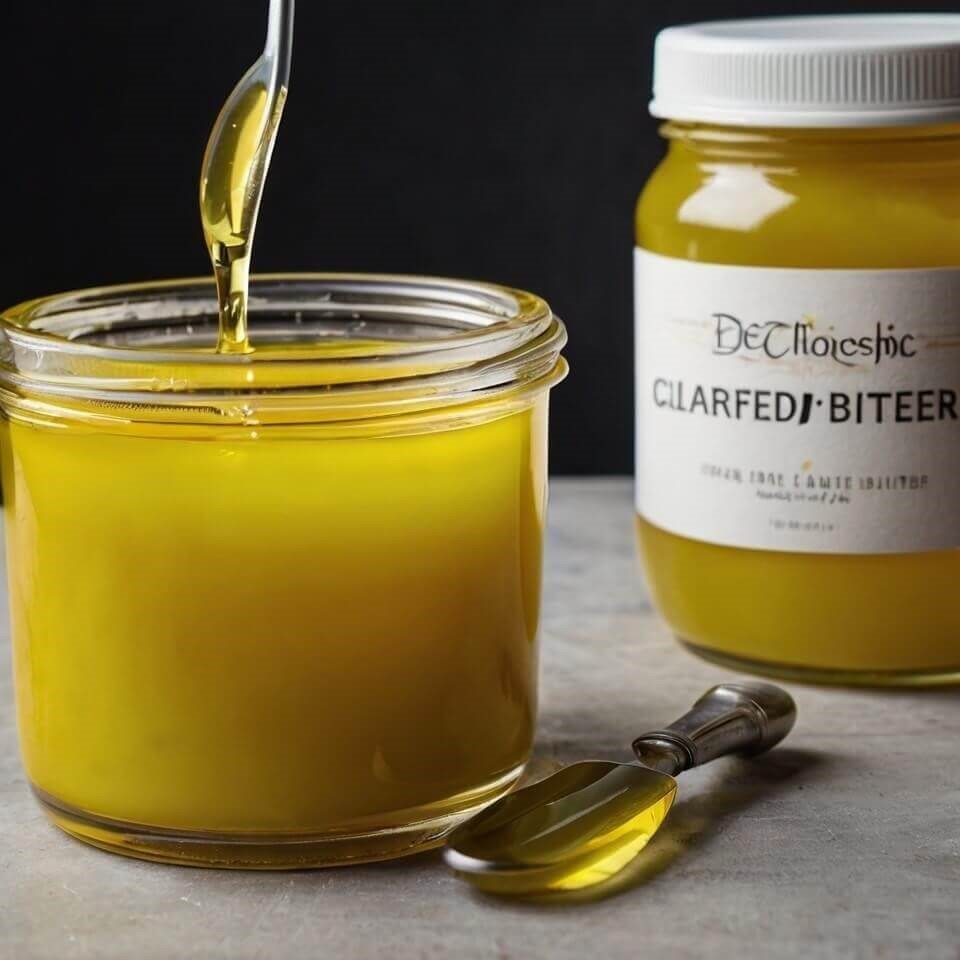
India is famous for its ancient proverbial tales describing it as a country of flowing rivers of ghee and milk. This has been a remarkable way of passing on ancient wisdom giving importance to essential substances in our daily lives to the younger generation. With its roots in India, Ghee holds a special place in our culinary skills and is a sacred ingredient in our religious practices and medicinal preparations. People dealing with thyroid-related disorders often question their dietary choices. A common worry “Is Ghee good for your thyroid?” frequently troubles them. The article will look at a thorough and well-researched answer to this query.
Also Read: WellHealth Ayurvedic Health Tips
Thyroid Health and You
The thyroid hormones are essential for regulating various bodily functions.
The thyroid gland is responsible for the production of thyroid hormones.
Looking at the crucial role thyroid hormones play in our body; it is necessary to ensure their health.
Some of the crucial roles played by the thyroid hormones include regulating breathing, heart rate, weight, digestion, mood, growth and development, muscle function, brain development, and the maintenance of bones.
Any disturbance with thyroid hormone manifests in the form of mental, emotional, and physical troubles.
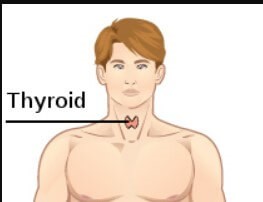
Image courtesy: Wikimedia
Physically, a person can experience fluctuations in weight, and the development of dry or brittle hair, skin, and nails.
On a mental and emotional level, a disturbed thyroid function can lead to fatigue, anxiety, depression, and cognitive challenges.
Ghee and its Nutrition
Ghee or clarified butter is made using the milk, curd, butter, or cream of cows, buffalos, sheep, or goats.
It is found to be rich in saturated fatty acids.
Ghee contains fatty acids, cholesterol, omega 3, saturated fats, monounsaturated fats, polyunsaturated fats, and vitamins A, B, D, K, and E.
It also contains a small amount of water.
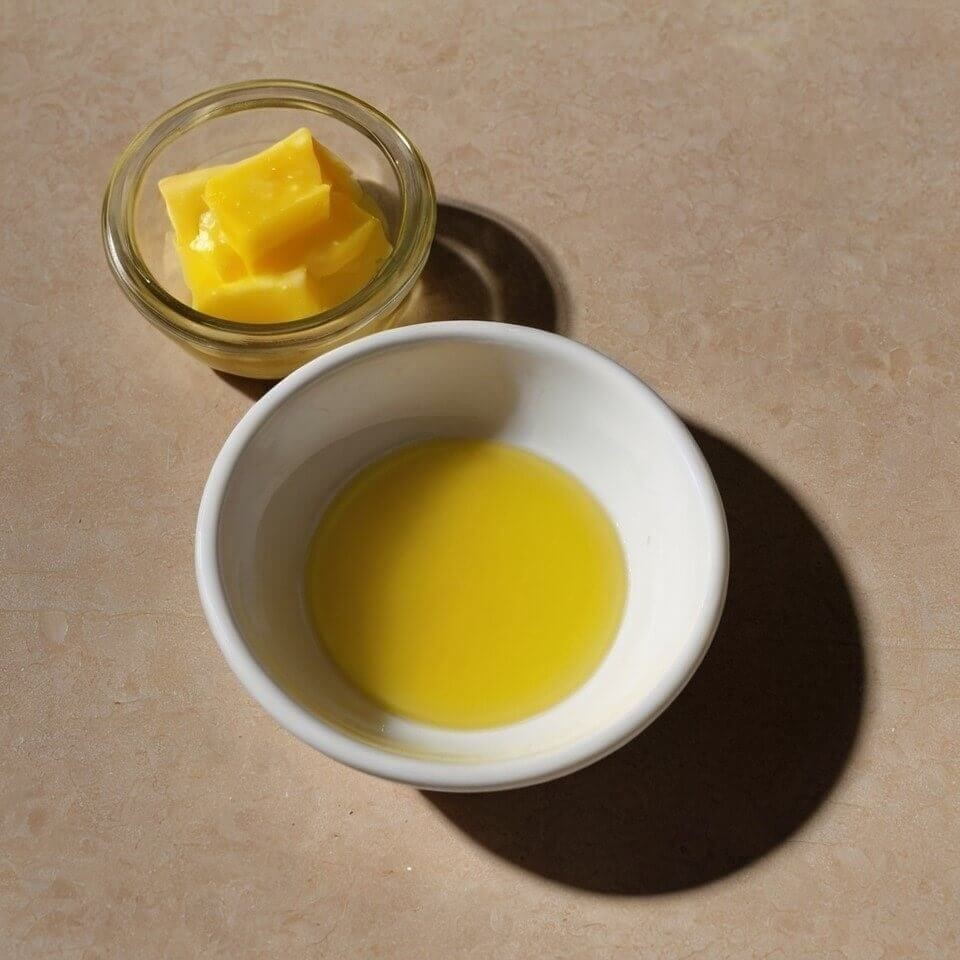
Let’s, now see how ghee is good for your health.
- Consuming ghee in your diet can help to improve your cholesterol levels, protect against clogging of arteries, and increase antioxidant levels.
- It is also found to have a positive impact on the reproductive system.
- 100 ml of ghee gives approx., 883 calories of energy.
- Ayurveda considers ghee the healthiest source of edible fat.
- It contains iodine, which is essential for the production of thyroid hormone.
Ghee contains small amounts of protein, carbohydrates, sugar, or fiber. It is purely fat with cholesterol.
Is Ghee Good for your Thyroid? – Unveiling the Connection
Fats and oils provide the necessary energy and nutrients to the human body and must be a part of a balanced diet.
Dietary fats and oils play an important role in supporting the thyroid functions.
It is to be noted that the thyroid gland depends on specific fats to create hormones and perform its functions.
The thyroid function is also connected to the fat-soluble vitamins such as A, D, E, and K.
The intake of fats helps absorb these vitamins which in turn helps maintain thyroid health.
Ghee has a lot of saturated fats but when eaten in moderation it is not harmful to your health.
Is Ghee good for your thyroid?
Yes, it has iodine which is good for your thyroid.
Ghee contains beneficial fats, antioxidants, and conjugated linoleic acid (CLA), which support improved thyroid function.
Including ghee in your diet helps maintain a healthy thyroid and hormonal balance, particularly when your thyroid is not functioning well.

Is Ghee Good for your Thyroid?
Ghee has many beneficial components that are good for thyroid health.
Let us talk about them in this section:
A.) Fatty Acids and Thyroid Health
Ghee contains approx., 46-47.8% Saturated Fatty Acids (SFA), 36% Monounsaturated Fatty Acid (MUFA), 18% Polyunsaturated Fatty Acid (PUFA), and notable ruminant Trans-Fatty Acids (r TFA), which have an impact on your thyroid health.
Saturated fats are essential for making hormones in our bodies. They are needed for the thyroid to work properly.
Monounsaturated fats also have several health benefits to offer.

Image credit: picpedia.org
An article published in Harvard Health Publishing emphasizes the need to cut down on bad fats.
As per the article, healthy fats such as monounsaturated and polyunsaturated fats reduce LDL cholesterol and should be eaten in moderation to promote a healthy thyroid.
B.) Short and Medium Chain Fatty Acids & Thyroid Health
Short-chain fatty acids (SCFAs) are considered crucial for maintaining thyroid health.
SCFAs are made by helpful bacteria in our gut and are known to play a crucial role in the working of the thyroid.
They strengthen the connection between the cells in your intestines, which creates a barrier that stops harmful germs from getting through.
This is crucial, especially in health issues like Grave’s disease and Hashimoto’s thyroiditis, where the gut’s protective barrier is not working properly.
Any imbalance of microorganisms also affects the absorption of minerals crucial for proper thyroid functioning such as iodine, selenium, zinc, and iron.
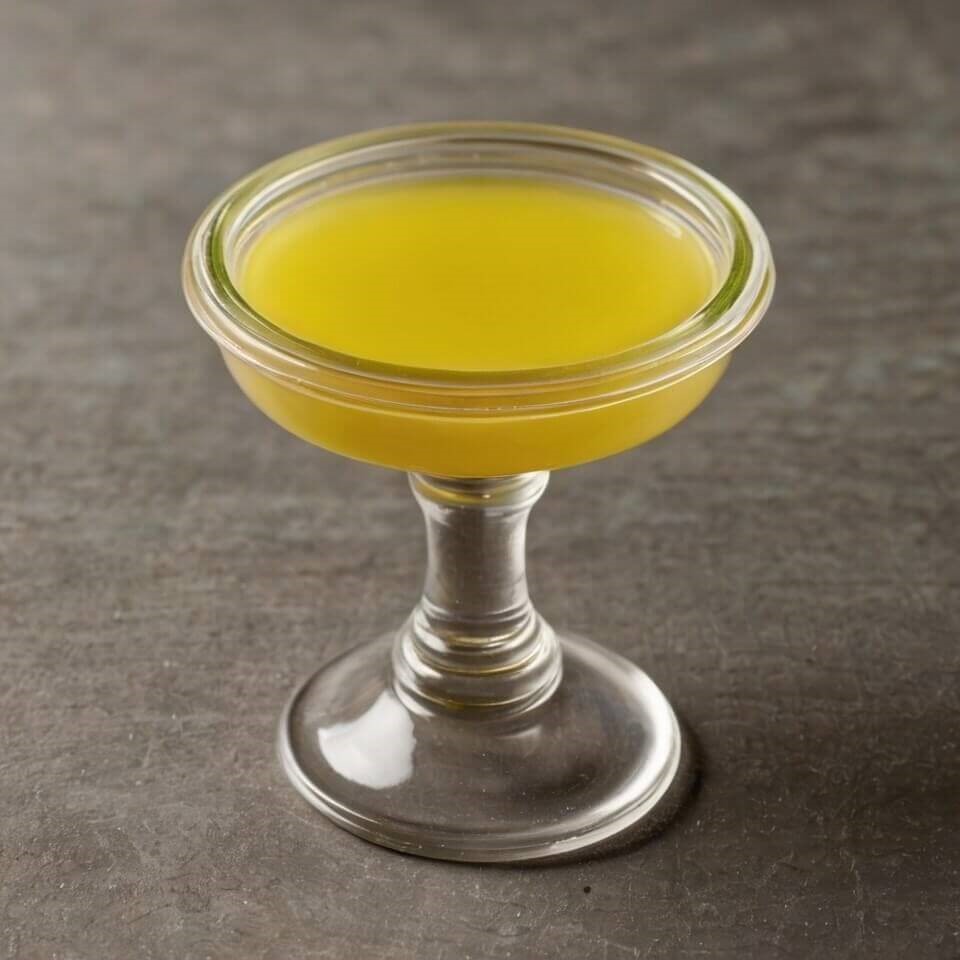
Medium-chain fatty acids (MCFAs) are good for the thyroid because they convert into energy quickly, supporting the metabolism and helping the body produce heat.
MCFAs are easy to digest leading the body to utilize energy efficiently and possibly helping with weight control, which is important for a healthy thyroid.
Some MCFAs, like lauric acid, also act as antioxidants, helping reduce stress in our bodies.
Experts advise including MCFAs in moderation in our diet to support thryoid health.
Since ghee is a rich source of short-chain fatty acids (SCFAs) and medium-chain fatty acids (MCFAs), it can be a valuable addition to our diets to maintain our thyroid health.
C.) Butyric Acid & Thyroid Health
Butyric acid gives a distinct flavor to ghee and makes it easier to digest.
Research in Frontiers suggests that butyrate, a substance naturally present in our gut, might be connected to how the thyroid works.
Butyrate is a short-chain fatty acid (SCFA), that helps in a balanced and healthy gut environment by guiding our immune system and reducing inflammation.
Butyrate controls certain cell activities, such as regulating their growth and helping the thyroid absorb iodine, which it needs to function properly.
Is ghee good for your thyroid? – Yes, the positive effects of ghee are mainly due to a health-friendly short-chain fatty acid known as butyric acid.
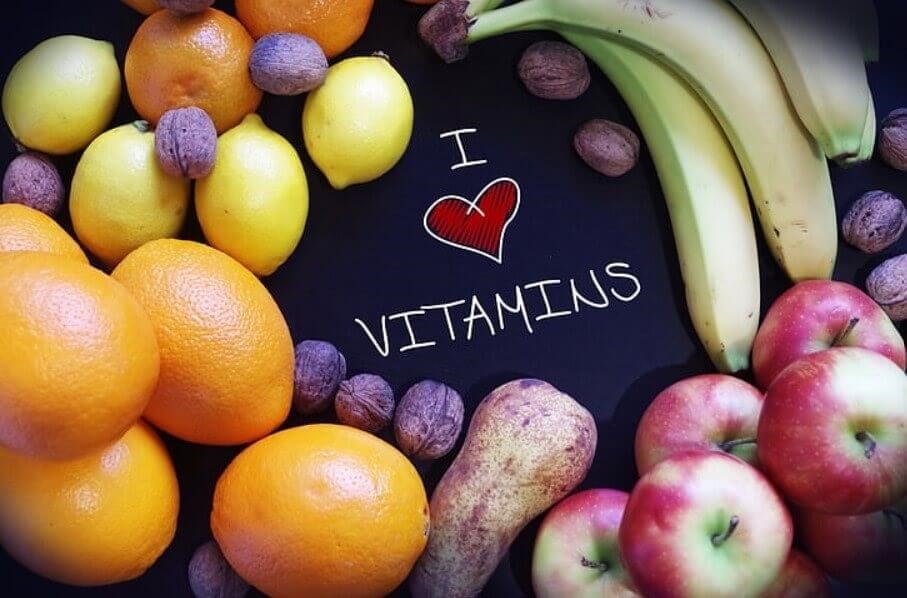
D.) Fat-Soluble Vitamins & Thyroid Health
Ghee is a significant source of fat-soluble vitamins A, D, K, and E.
These vitamins have various health benefits and are crucial as our bodies cannot make them.
The vitamins support our thyroid health and eating ghee regularly helps their absorption.
Also Read – Vitamin B12 Rich Dry Fruits: Nature’s Gift to You
E.) Source of Iodine
Iodine deficiency is one of the most common causes of thyroid-related disorders.
The body needs iodine to produce thyroid hormones.
Including ghee in your diet can help keep your thyroid health in check.
Tips for Including Ghee by Thyroid Patients
Ayurveda recommends eating ghee daily in moderation. As per Ayurveda, ghee is one of the healthiest foods available.
Thyroid patients too can include ghee as a daily part of their diets by keeping the following points in mind:
- Moderation is the Key – Ayurveda recommends eating ghee in moderation daily to reap maximum benefits. Experts advise using 1-2 tablespoons of ghee daily.
- Suitable for Cooking – Thyroid patients can use ghee for cooking since it has a high smoke point. It is suitable for various forms of cooking such as sauteing, frying, roasting, etc.
- Use as a Spreader – The best way to include ghee in your diet is by putting it over your dishes, toasts, soups, etc. This also enhances the flavor and aroma of the food.
- How to Buy – When buying ghee, choose a high-quality option such as grass-fed and organic, without any preservatives or additives.
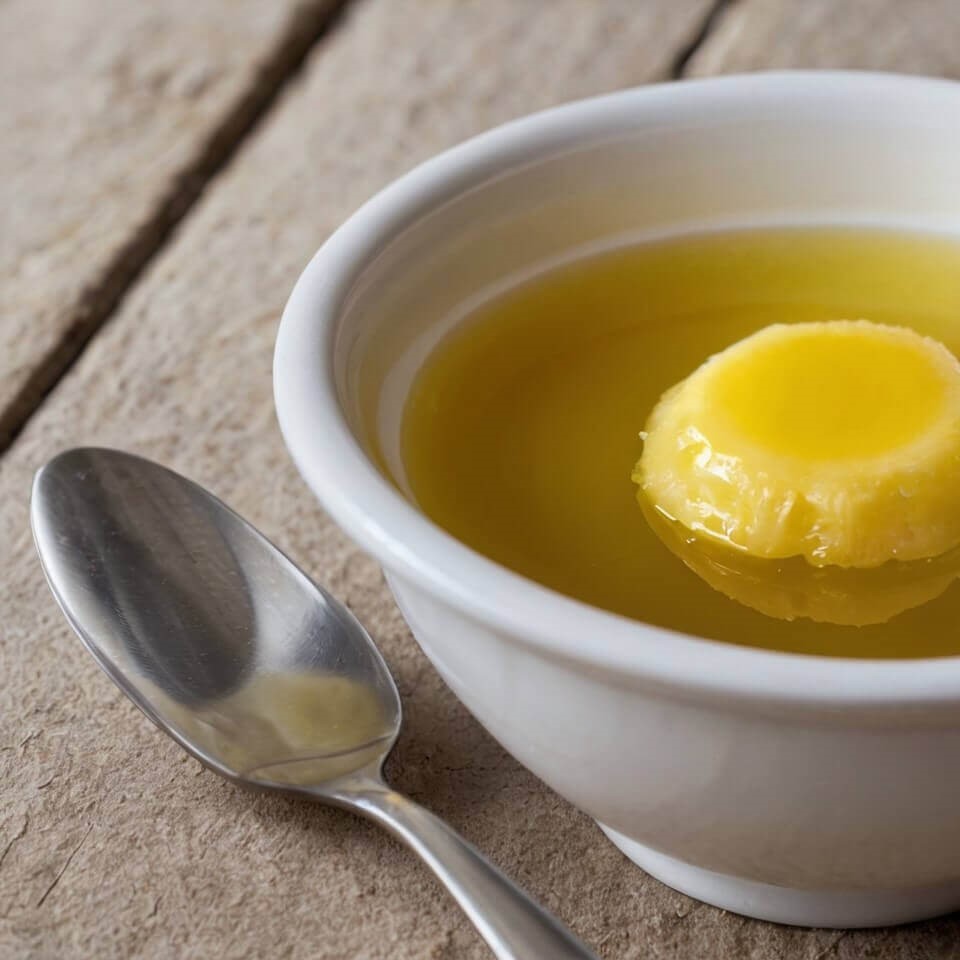
The Takeaway
Ayurveda has placed huge importance on ghee as a daily nourisher for our body and mind.
The existence of SCFAs, CLAs, omega-3 and omega-6 fatty acids, and phospholipids make ghee uniquely beneficial.
Researchers are increasingly recognizing the various health benefits of ghee, such as reducing inflammation, acting as an antioxidant, and promoting thyroid health.
The past research primarily focused on saturated fats, however, they now widely recognize the benefits of diverse fats present in ghee.
When talking about whether ghee is good for your thyroid, the answer lies in various beneficial components found in ghee such as medium-chain triglycerides (MCTs), fat-soluble vitamins, and short-chain fatty acids (SCFAs), all contributing to thyroid health.
Disclaimer: The views expressed in this article should not be considered as a substitute for a physician’s advice. Please consult your treating physician for more details.
Readings & References
- https://www.ncbi.nlm.nih.gov/pmc/articles/PMC9861198/
- https://en.wikipedia.org/wiki/Ghee
- https://www.ncbi.nlm.nih.gov/pmc/articles/PMC4220075/
- https://www.godrejjersey.com/blogs/9-proven-benefits-of-ghee
- https://www.ncbi.nlm.nih.gov/pmc/articles/PMC9571437/
- https://www.health.harvard.edu/staying-healthy/healthy-eating-for-a-healthy-thyroid#:~:text=Cut%20down%20on%20%22bad%22%20fats%20and%20simple%20carbohydrates.&text=Instead%2C%20choose%20fats%20that%20help,legumes%20are%20also%20healthy%20choices.
- https://www.mdpi.com/2077-0383/10/16/3609#:~:text=SCFAs%20are%20a%20valuable%20source,)%20%5B78%2C79%5D.
- https://www.frontiersin.org/articles/10.3389/fcimb.2021.643968/full
- https://www.ncbi.nlm.nih.gov/pmc/articles/PMC10789628/#:~:text=Ghee%20also%20finds%20mention%20as,no%20harm%20on%20daily%20consumption.
Very good and impotant article. Congrats.